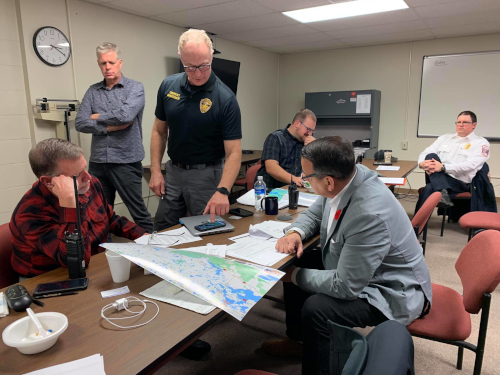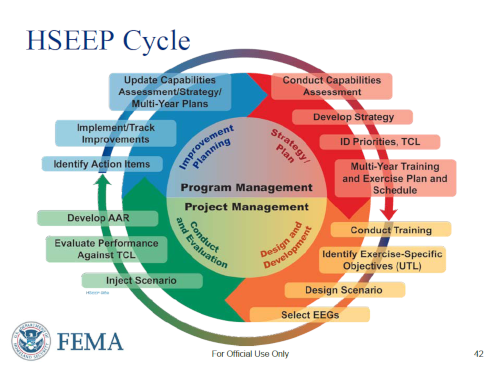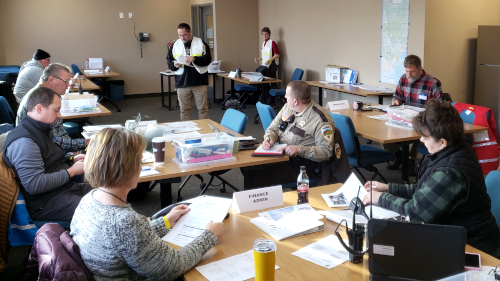Exercises / Drills
Exercises and drills provide an opportunity to demonstrate, evaluate, and improve the ability of core capabilities to perform assigned missions and tasks to relative standards.
There are 2 types of Exercises:
1. Discussion-Based Exercises -
Discussion-based exercises include seminars, workshops, tabletop exercises (TTXs), and games. These types of exercises familiarize players with or develop new plans, policies, procedures, and agreements. Discussion-based exercises focus on strategic, policy-oriented issues, and facilitators or presenters lead the discussion, keeping participants moving towards meeting the exercise objectives. (FEMA)
2. Operations-Based Exercises -
Operations-based exercises include drills, functional exercises (FE), and full-scale exercises (FSE). These exercises validate plans, policies, procedures, and agreements; clarify roles and responsibilities; and identify resource gaps. Operations-based exercises include a real-time response such as initiating communications or mobilizing personnel and resources. (FEMA)

A strongly developed exercise can put a bow on a strong and prepared organizational process, but MUST founded on the plans and trainings each jurisdiction, agency, or business has developed and hosted. Many times, agencies simply want to host an exercise, which can sometimes turn out valuable, but more often than not, unless there is a broader planning process occurring, are likely to fail in the delivery of primary objectives. FEMA highlights the Homeland Security Exercise and Evaluation Program (HSEEP) as the gold standard for the overarching exercise design guide.

Topics / Scenarios:
There are few ‘canned’ exercises provided at Paramount; lessons learned and documentation formatting can be used from previous exercises to streamline new exercise development, but core goals and objectives should be driven out of a stakeholder design team and the planning process. No exercise is the exact same, and pre-designed exercises, while more cost-effective, tend to be less effective than ones developed together with local stakeholders.
Any scenario can be utilized for an exercise, but generally fall into the categories below:
- Natural Hazards (flooding, tornado, high winds, ice storms, etc)
- Technological Hazards (train derailment, hazardous materials spill, pipeline rupture, building collapse, etc)
- Human-Caused Hazards (terrorism, cyber attacks, active shooter, violence, riots, etc)
- Policy/Procedure-Specific (communication exercises, team building, organizational development)
- Equipment (jaws of life, incident command trailer, radio communications)

TYPES OF EXERCISES PROVIDED
Seminar -
A discussion-based exercise that orients participants to or provides an overview of authorities, strategies, plans, policies, procedures, protocols, resources, concepts, and ideas; usually led by a facilitator.
Length: 1-4 hours
Workshop -
A discussion-based exercise often employed to develop policy, plans, or procedures that utilizes small group discussions and increased participant interaction.
Length: 4-8 hours
Exercise (TTX) -
A discussion-based exercise in response to a scenario, intended to generate a dialogue of various issues to facilitate a conceptual understanding, identify strengths and areas for improvement, and/or achieve changes in perceptions about plans, policies, or procedures.
Length: 3-5 hours
Game -
A discussion-based exercise that is a structured form of play designed for individuals or teams in a competitive or noncompetitive environment. It is an event players take part in and are guided by clear rules, data, and procedures for its execution. Games are designed to depict an actual or hypothetical situation to ensure that the participants make decisions and take actions that would be plausible. Games can be used to reinforce training, stimulate team building, or enhance operational and tactical capabilities.
Length: 1-2 hours
Drill -
An operations-based exercise often employed to validate a singe operation or function.
- Policy / Procedural Drills
- Equipment Drills
- Plan-testing Drills
Length: 1-2 hours
Enhanced-Tabletop Exercise (ETTX) -
This unique exercise format was designed by Paramount in 2018 to bridge the link between a tabletop discussion and a more hands-on functional or full-scale exercise; and features more hands on approach while maintaining the discussion-based core of a tabletop exercise.
Length: 3-6 hours
Functional Exercise (FE) -
An operations-based exercise is designed to test and evaluate capabilities and functions while in a realistic, real-time environment; however, movement of resources is usually simulated.
Length: 2-4 hours
Full Scale Exercise (FSE) -
An operations-based exercise that is typically the most complex and resource-intensive of the exercise types and often involves multiple agencies, jurisdictions/organizations, and real-time movement of resources.
Length: 1-2 days
